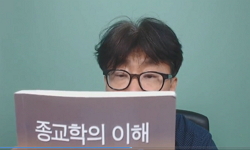The purpose of this study is to examine the association between socio-demographic characteristics and psychological distress and the effect of religion on psychological distress among older Korean immigrants in the United States. This study is based o...
http://chineseinput.net/에서 pinyin(병음)방식으로 중국어를 변환할 수 있습니다.
변환된 중국어를 복사하여 사용하시면 됩니다.
- 中文 을 입력하시려면 zhongwen을 입력하시고 space를누르시면됩니다.
- 北京 을 입력하시려면 beijing을 입력하시고 space를 누르시면 됩니다.

미주 한인노인의 심리적 고통에 종교가 미치는 영향 = Religious Involvement and Psychological Distress Among Older Korean Immigrants in the United States
한글로보기https://www.riss.kr/link?id=A106051375
-
저자
CHANG MIYA (대구가톨릭대학교)
- 발행기관
- 학술지명
- 권호사항
-
발행연도
2019
-
작성언어
Korean
- 주제어
-
등재정보
KCI등재후보
-
자료형태
학술저널
-
수록면
112-136(25쪽)
-
KCI 피인용횟수
0
- DOI식별코드
- 제공처
-
0
상세조회 -
0
다운로드
부가정보
다국어 초록 (Multilingual Abstract)
The purpose of this study is to examine the association between socio-demographic characteristics and psychological distress and the effect of religion on psychological distress among older Korean immigrants in the United States. This study is based on primary data collected from self-administered surveys taken by 240 older Koreans (60 years to 79 years)in the United States. Data were collected from November 2016 to January 2017. About 13% of older Korean immigrants in the United States reported ‘severe’ psychological distress. Marital status and educational attainment, health status, overall financial status, and religion were statistically significantly associated with psychological distress, while gender and English proficiency were not significantly associated with psychological distress among older Korean immigrants in the United States. Results from hierarchal multivariate regression models indicated (1) experience of psychological distress were positively associated with negative socio-demographic characteristics; and (2) religious involvement did not buffered on psychological distress. Finally, the study results highlight several policies to reduce the risk of psychological distress among older Korean immigrants in the United States.
국문 초록 (Abstract)
본 연구의 목적은 미주 한인노인을 대상으로 인구사회학적 특성과 심리적 고통과의 관계를 알아보고 한인노인의 심리적 고통에 종교의 역할이 어떤 영향을 미치는지알아보고자 한다. 연구...
본 연구의 목적은 미주 한인노인을 대상으로 인구사회학적 특성과 심리적 고통과의 관계를 알아보고 한인노인의 심리적 고통에 종교의 역할이 어떤 영향을 미치는지알아보고자 한다. 연구대상자는 Los Angeles county에 거주하는 한인노인들이며최종 연구대상자는 240명으로 정해졌다. 설문조사 시기는 2016년 11월부터 2017 년 1월까지 이루어졌다. 미주 한인노인의 심리적 고통을 살펴본 결과 약 13%가심리적 고통이 ‘심각함’으로 나타났다. 이원분석에서 인구사회학적 특성에 따라심리적 고통 정도를 분석한 결과는 나이, 교육정도, 혼인여부, 건강관련 요소, 한 달 수입, 주관적으로 느끼는 경제상태, 수입출처, 미국에 거주한 기간, 그리고종교는 통계적으로 유의미하였다. 그 외의 성별과, 영어의 숙련도는 통계적으로유의미하지 못했다. 위계적 회귀분석을 통해 나타난 결과는 열악한 인구사회학적인요소는 심리적 고통과 정적 상관 관계로 나타났으나, 종교는 심리적 고통을 완화시켜 주는 역할을 설명하는데 통계적으로 유의미하지 않았다. 종교가 심리적 고통을완화해 주는 변인이 아니었다. 이러한 분석결과를 토대로 미주 한인노인의 심리적고통을 줄이기 위한 정책적 시사점을 제시하였다.
참고문헌 (Reference)
1 통계청, "고령자 통계"
2 Leung, P, "Vietnamese Americans and Depression: A Health and MentalHealth Concern" 8 (8): 526-542, 2010
3 Abe-Kim, J., "Use of mental health-related services among immigrant and U.S. born Asian Americans: Results from the National Latino and Asian American study" 97 (97): 91-98, 2007
4 Rhee, M. K., "Understanding employment barriers among older Korean immigrants" 55 (55): 472-482, 2013
5 Kim, J., "Trends of religious identification in Korea : Changes and continuities" 48 (48): 789-793, 2009
6 Schieman, S., "The sense of divine control and psychological distress : Variations across race and socioeconomic status" 45 : 529-549, 2006
7 Diener, E., "The religion paradox: If religion makes people happy, why are so many dropping out?" 101 (101): 1278-1290, 2011
8 Ahn, J., "The relationships between functional limitation, depression, suicidal ideation, and coping in older Korean immigrants" 17 : 1643-1653, 2015
9 Tepper, L., "The prevalence of religious coping among persons with persistent mental illness" 52 : 660-665, 2001
10 Sue, S., "The case for cultural competency in Psychotherapeutic interventions" 60 : 525-548, 2009
1 통계청, "고령자 통계"
2 Leung, P, "Vietnamese Americans and Depression: A Health and MentalHealth Concern" 8 (8): 526-542, 2010
3 Abe-Kim, J., "Use of mental health-related services among immigrant and U.S. born Asian Americans: Results from the National Latino and Asian American study" 97 (97): 91-98, 2007
4 Rhee, M. K., "Understanding employment barriers among older Korean immigrants" 55 (55): 472-482, 2013
5 Kim, J., "Trends of religious identification in Korea : Changes and continuities" 48 (48): 789-793, 2009
6 Schieman, S., "The sense of divine control and psychological distress : Variations across race and socioeconomic status" 45 : 529-549, 2006
7 Diener, E., "The religion paradox: If religion makes people happy, why are so many dropping out?" 101 (101): 1278-1290, 2011
8 Ahn, J., "The relationships between functional limitation, depression, suicidal ideation, and coping in older Korean immigrants" 17 : 1643-1653, 2015
9 Tepper, L., "The prevalence of religious coping among persons with persistent mental illness" 52 : 660-665, 2001
10 Sue, S., "The case for cultural competency in Psychotherapeutic interventions" 60 : 525-548, 2009
11 Gee, G. C., "The association between self-reported racial discrimination and 12-month DSM-IV mental disorders among Asian Americans nationwide" 64 (64): 1984-1996, 2007
12 Hirschman, C., "The Role of Religion in the Origins and Adaptation of Immigrant Groups in the United States 1" 38 (38): 1206-1233, 2004
13 Kessler, R. C., "Short screening scales to monitor population prevalence and trends in non-specific psychological distress" 32 : 959-976, 2002
14 Stokes, S. C., "Screening for depression in immigrant Chinese-American elders : Results of a pilot study" 36 (36): 27-44, 2002
15 Taylor, R., "Religion in the lives of African-Americans: Social, psychological, and health perspectives" 2004
16 Lee, E. K. O., "Religion and spirituality as predictors of well-being among Chinese American and Korean American older adults" 19 (19): 77-100, 2007
17 Behere, P. B., "Religion and mental health" 55 (55): 187-194, 2013
18 Koenig, H. G., "Religion and depression in older medical inpatients" 15 : 282-291, 2007
19 Tsai, Y.F., "Prevalence and risk factors for depressive symptoms among community-dwelling elders in Taiwan" 20 (20): 1097-1102, 2005
20 Djernes, J. K., "Prevalence and predictors of depression in populations of elderly : a review" 113 (113): 372-387, 2006
21 Papadopoulos, F.C., "Prevalence and correlates of depression in late life : a population based study from a rural Greek town" 20 (20): 350-357, 2005
22 Chou, K. L., "Prevalence and correlates of depression in Chinese oldest-old" 20 : 41-50, 2005
23 Luppa, M, "Prediction of institutionalization in the elderly. A systematic review" 39 (39): 31-38, 2010
24 US Census Bureau, "Older Population and Aging"
25 Kraaij, V., "Negative life events and depression in elderly persons a meta-analysis" 57 (57): P87-P94, 2002
26 Kraaij, V., "Negative life events and depression in elderly persons : A meta-analysis" 57B : 87-94, 2002
27 Kuo, B. C. H., "Navigating multiculturalism: Negotiating change" Cambridge Scholars Publishing 373-392, 2006
28 Idler, E. L., "Measuring multiple dimensions of religion and spirituality for health research : Conceptual background and findings from the 1998 General Social Survey" 25 (25): 327-365, 2003
29 Jang, S. N., "Marital status, gender, and depression : analysis of the baseline survey of the Korean Longitudinal Study of Ageing" 69 (69): 1608-1615, 2009
30 Lai, D. W. L., "Impact of culture on depressive symptoms of elderly Chinese immigrants. Canadian" 49 : 820-827, 2004
31 Jang, Y., "Health perception and depressive symptoms among older Korean Americans" 21 (21): 91-102, 2006
32 Koenig, H., "Handbook of religion and health" Oup Usa 2012
33 Reich, J. W., "Handbook of adult resilience" Guilford Press 2010
34 Moon, A., "Handbook of Race and Development in Mental Health" 189-206, 2012
35 Jang, Y., "Gender differences in depressive symptoms among older Korean American immigrants" 26 (26): 96-109, 2011
36 Jeon, G. S., "Gender differences in correlates of mental health among elderly Koreans" 62 (62): S323-S329, 2007
37 Ryu, S., "Faith, spirituality, and values among Asian-American older adults: an exploratory factor analysis of the Multidimensional Measures of Religion and Spirituality" 19 (19): 920-931, 2016
38 Spencer, M.S., "Effect of discrimination on menial health service utilization among Chinese Americans" 94 (94): 809-814, 2004
39 Min, J. W., "Determinants of psychological distress over time among older Korean immigrants and Non-Hispanic White elders : Evidence from a two-wave panel study" 9 (9): 210-222, 2005
40 Ina, K., "Depression, quality of life and will to live of community-dwelling postmenopausal women in three Asian countries : Korea, China and Japan" 53 (53): 8-12, 2011
41 Espiritu, D. A. V., "Depression, cognitive impairment and function in Alzheimer's disease" 16 (16): 1098-1103, 2001
42 Blazer, D.G., "Depression in late life : Review and commentary" 58 (58): 249-265, 2003
43 Kuo, B. C. H., "Depression and its psychosocial correlates among older Asian immigrants in North America" 20 (20): 615-652, 2008
44 Lai, D. W. L., "Depression among elderly Chinese-Canadian immigrants from Mainland China" 117 : 677-683, 2004
45 Lee, H. Y., "Depression among Elderly Korean immigrants: Exploringsocio-cultural factors" 13 (13): 1-26, 2005
46 Yeung, A., "Culturally sensitive collaborative treatment for depressed Chinese Americans in primary care" 100 : 2397-2402, 2010
47 Luppa, M., "Cost-Of illness studies of depression: a systematic review" 98 (98): 29-43, 2007
48 Preville, M., "Correlates of suicide in the older adult population in Quebec" 35 (35): 91-105, 2005
49 Chang, M., "Correlates and Predictors of Psychological Distress among Older Asian Immigrants in California" 59 (59): 77-97, 2016
50 Cho, J., "Association between cancer stigma and depression among cancer survivors : a nationwide survey in Korea" 22 (22): 2372-2378, 2013
51 U.S. Census Bureau, "An Aging Nation: The older population in the United States, Populations Estimates and Projections" 25-1140, 2014
52 Luppa M, "Age-and gender-specific prevalence of depression in latest-life-systematic review and meta-analysis" 136 (136): 212-221, 2010
53 Chittleborough, C. R., "Age differences in associations between psychological distress and chronic conditions" 56 (56): 71-80, 2011
54 Mui, A., "Acculturation stress and depression among Asian immigrant elders" 51 (51): 243-255, 2006
동일학술지(권/호) 다른 논문
-
- 사단법인 한국민족연구원
- 강진웅
- 2019
- KCI등재후보
-
- 사단법인 한국민족연구원
- Ru xie
- 2019
- KCI등재후보
-
한국 통일연구의 새로운 접근 필요성 유럽연합의 변화와 시사점
- 사단법인 한국민족연구원
- 황기식
- 2019
- KCI등재후보
-
- 사단법인 한국민족연구원
- 최대희
- 2019
- KCI등재후보
분석정보
인용정보 인용지수 설명보기
학술지 이력
| 연월일 | 이력구분 | 이력상세 | 등재구분 |
|---|---|---|---|
| 2023 | 평가예정 | 재인증평가 신청대상 (재인증) | |
| 2020-01-01 | 평가 | 등재학술지 선정 (재인증) |  |
| 2019-01-01 | 평가 | 등재후보학술지 유지 (계속평가) |  |
| 2018-01-01 | 평가 | 등재후보학술지 유지 (계속평가) |  |
| 2016-01-01 | 평가 | 등재후보학술지 선정 (신규평가) |  |
| 2015-12-01 | 평가 | 등재후보 탈락 (기타) | |
| 2013-01-01 | 평가 | 등재후보 1차 PASS (등재후보1차) |  |
| 2012-01-01 | 평가 | 등재후보학술지 유지 (기타) |  |
| 2011-01-01 | 평가 | 등재후보학술지 유지 (등재후보1차) |  |
| 2009-01-01 | 평가 | 등재후보학술지 선정 (신규평가) |  |
학술지 인용정보
| 기준연도 | WOS-KCI 통합IF(2년) | KCIF(2년) | KCIF(3년) |
|---|---|---|---|
| 2016 | 0.67 | 0.67 | 0.51 |
| KCIF(4년) | KCIF(5년) | 중심성지수(3년) | 즉시성지수 |
| 0.46 | 0.4 | 0.714 | 0.48 |




 KCI
KCI KISS
KISS






